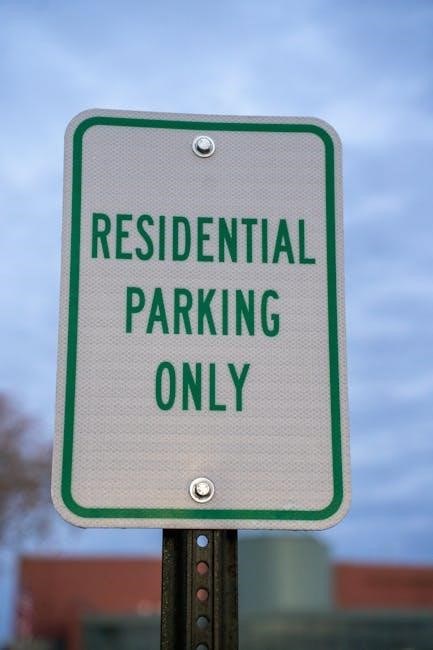Minnesota Rule 220 governs the registration of memorials on certificates of title, requiring official birth certificates and affidavits to protect public interests and ensure regulatory compliance in real estate transactions.
Overview of Minnesota Rule 220
Minnesota Rule 220 is a legal provision that outlines the process for registering memorials on certificates of title, specifically requiring the submission of official birth certificates and affidavits. This rule ensures that real estate transactions are conducted transparently, preventing fraud and ensuring compliance with state regulations. It plays a crucial role in maintaining the integrity of property records and protecting the interests of all parties involved in land title transactions.
Significance of the Rule in Real Estate Transactions
Minnesota Rule 220 holds significant importance in real estate transactions by ensuring the authenticity and legality of property dealings. It mandates the use of official birth certificates and affidavits to validate ownership claims, thereby safeguarding against fraudulent activities. This rule not only protects buyers and sellers but also maintains the accuracy of public records, fostering trust and stability in the real estate market by upholding legal standards and regulatory compliance.

Purpose and Scope of Rule 220
Minnesota Rule 220 provides a legal framework for registering memorials on property titles, ensuring authenticity and preventing fraud in real estate transactions through regulatory compliance.
Legal Framework for Registration of Memorials
Minnesota Rule 220 establishes a framework for registering memorials on property titles, requiring official birth certificates and affidavits to ensure authenticity and prevent fraud. This rule operates under Title III of Minnesota’s land title registration laws, outlining procedural requirements for real estate transactions. By ensuring compliance with these legal standards, Rule 220 safeguards public interests and maintains the integrity of property records.
Protection of Public Interests and Regulatory Compliance
Minnesota Rule 220 ensures the protection of public interests by requiring authentic documentation, such as official birth certificates and affidavits, to prevent fraud in real estate transactions. This rule mandates compliance with legal standards, safeguarding property rights and maintaining the integrity of public records. By enforcing these requirements, Rule 220 upholds regulatory objectives, ensuring transparency and accountability in land title registrations while protecting the public from potential legal disputes and fraudulent activities.

Legal Requirements for Rule 220
Minnesota Rule 220 requires the submission of an official birth certificate and an affidavit from an affiant, attached to it, ensuring compliance with legal standards for real estate transactions.
Official Birth Certificate Submission
Minnesota Rule 220 mandates the submission of an official birth certificate to the Registrar of Titles. This document must pertain to a registered owner named in the certificate of title and include the individual’s date of birth. The birth certificate serves as essential evidence for verifying ownership details and ensuring compliance with real estate transaction requirements under the rule.
Affidavit Requirements for Registration
The affidavit required under Minnesota Rule 220 must be attached to the official birth certificate and completed by an affiant familiar with the facts. The affidavit verifies the identity of the registered owner and confirms the authenticity of the birth certificate. This step ensures compliance with legal standards and maintains the integrity of the registration process. Accurate and complete documentation is essential to avoid delays or rejection in real estate transactions.

Accessing the Minnesota 220 Rule Form
The Minnesota 220 Rule Form can be downloaded as a PDF from the official Minnesota website. Users can also utilize online editors for efficient form completion.
Downloading the PDF from Official Sources
To obtain the Minnesota 220 Rule Form, visit the official Minnesota website and navigate to the General Rules of Practice section. Search for Rule 220, and download the PDF version directly. This form is freely accessible and can be saved for offline use. Ensure you have a PDF reader, such as Adobe Acrobat, to view and print the document. Using the official source guarantees authenticity and compliance with legal requirements.
Using Online Editors for Form Completion
Online editors simplify the Minnesota 220 Rule Form completion process. Tools like Adobe Acrobat or specialized form editors allow users to fill out the PDF digitally. Features such as digital signatures, fillable fields, and real-time collaboration enhance efficiency. These platforms often include validation checks to ensure accuracy and compliance with formatting requirements. Completing the form online saves time and reduces the risk of errors, making it a convenient option for users.


Process for Using the Minnesota 220 Form
The process involves obtaining the Minnesota 220 Form, completing it accurately, attaching required documents like birth certificates and affidavits, and submitting it to the Registrar of Titles for registration;

Step-by-Step Guide to Form Submission
Download the Minnesota 220 Rule Form PDF from the official Minnesota website or authorized sources.
Carefully fill out the form using an online editor or by printing and completing it manually.
Attach the required official birth certificate and a notarized affidavit as specified.
Ensure all information is accurate and complete to avoid delays.
Submit the form to the Registrar of Titles for processing.
Follow up to confirm successful registration and receipt of the memorial.
Importance of Accurate Documentation
Accurate documentation is crucial for compliance with Minnesota Rule 220, ensuring legal validity and preventing delays. Errors or omissions in the birth certificate or affidavit can lead to rejected submissions or legal complications. Properly completed forms protect public interests and maintain the integrity of real estate transactions. Attention to detail ensures smooth processing and upholds regulatory standards, avoiding potential disputes or penalties. Precision in documentation is essential for successful registration and legal enforcement under this rule.

Judicial Discretion in Enforcing Rule 220
Courts may exercise discretion in enforcing Minnesota Rule 220 based on case specifics, balancing procedural requirements with fairness and the rule’s intent to protect public interests.
Court Considerations in Case-Specific Enforcement
Courts consider the complexity of each case, the nature of noncompliance, and its impact on proceedings when enforcing Minnesota Rule 220. Judges balance strict adherence to the rule with case-specific nuances, ensuring fairness while upholding legal standards. This discretionary approach allows for tailored decisions, focusing on the rule’s intent to protect public interests and maintain regulatory integrity in real estate transactions.
Impact of Noncompliance on Legal Proceedings
Noncompliance with Minnesota Rule 220 can lead to legal consequences, including delays or dismissal of cases. Courts may impose penalties or require additional documentation, potentially undermining the legitimacy of real estate transactions. The failure to adhere to the rule’s requirements can disrupt proceedings, emphasizing the importance of strict compliance to maintain the integrity of the legal process and protect all parties involved in land title registrations.

Historical Context and Legislative Intent
Minnesota Rule 220 was enacted to enhance regulatory compliance and protect public interests, addressing modern business and environmental challenges with a clear legal framework for land transactions.
Evolution of the Rule in Minnesota Law
Minnesota Rule 220 has evolved to address the complexities of modern real estate transactions, ensuring that memorials are registered accurately. Initially focusing on title registration, the rule has expanded to incorporate official birth certificates and affidavits, streamlining processes while maintaining legal integrity. This evolution reflects Minnesota’s commitment to adapting legal frameworks to meet contemporary challenges in property law and regulatory compliance, ensuring transparency and public trust in land transactions.
Legislative Objectives Behind the Rule
The legislative intent behind Minnesota Rule 220 was to establish a clear framework for registering memorials on certificates of title, ensuring accuracy and legal compliance. The rule aims to protect public interests by requiring official birth certificates and affidavits, thereby maintaining the integrity of real estate transactions. Its objectives include streamlining processes, preventing disputes, and fostering trust in the legal system by ensuring all documentation is verifiable and standardized.

Common Challenges and Solutions
Overcoming Documentation Hurdles
Common challenges include ensuring accurate and complete documentation. Solutions involve using online form editors to simplify completion and verifying birth certificate authenticity before submission to avoid delays.
Addressing Issues in Form Completion
Common challenges in completing the Minnesota 220 Rule form include ensuring accurate and complete documentation. To address this, users can utilize online form editors that provide guidance for each field, reducing errors. Additionally, verifying the authenticity of birth certificates and ensuring all required affidavits are properly notarized can simplify the process. Properly formatted templates and clear instructions also help filers avoid omissions and delays in submission.
Documentation challenges for Minnesota Rule 220 can be resolved by ensuring all required fields are accurately completed and verified. Utilizing online form editors with built-in validation tools helps prevent errors. Additionally, consulting official Minnesota resources or legal professionals can clarify uncertainties. Properly formatting and notarizing affidavits, along with submitting authentic birth certificates, ensures compliance and avoids delays. Attention to detail and adherence to guidelines are key to overcoming these hurdles effectively.
Minnesota Rule 220 is crucial for real estate transactions, mandating birth certificates and affidavits for title registration to ensure regulatory compliance and protect public interests effectively.
Minnesota Rule 220 outlines the legal process for registering memorials on certificates of title, requiring official birth certificates and affidavits. It ensures compliance with real estate regulations, protects public interests, and maintains the integrity of land title transactions. Proper documentation and adherence to the rule are essential to avoid legal complications and ensure smooth real estate proceedings in Minnesota.
Final Thoughts on the Importance of Rule 220
Minnesota Rule 220 is a cornerstone of real estate and legal processes, ensuring transparency and compliance. Its requirements for birth certificates and affidavits safeguard property rights and public trust. By adhering to Rule 220, individuals and entities maintain the integrity of land transactions, preventing disputes and upholding legal standards. This rule exemplifies the balance between regulatory oversight and individual rights, making it indispensable in Minnesota’s legal framework.



